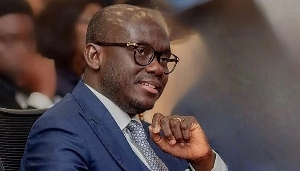 Attorney General, Godfred Dame
Attorney General, Godfred Dame
This article serves as a rebuttal to an article earlier authored by a respectable senior learned colleague and LLM mate at Kwame Nkrumah University of Science and Technology (KNUST), Daniel Korang, Esq., regarding the caption "whether or not the Attorney General erred in allegedly seeking to induce Richard Jakpa to testify in his favor."
The synopsis of the author’s article, which has predicated this rebuttal, reiterates that the use of prosecutorial inducements, threats, promises, and coercion is an integral part of plea bargaining, otherwise also called negotiated plea, settlement agreement, plea negotiation, etc., and that the AG committed no wrong in law or professionally. The author proceeded to introduce an alien phenomenon, "strategic overcharging," which had no basis in the foregoing discussions surrounding the AG’s alleged misconduct; hence, it will not constitute the focus of this article.
Historical Antecedents of Plea Bargaining in Ghana’s Criminal Jurisprudence
Plea bargaining is a process in criminal trials that offers an accused the privilege to negotiate with the prosecutor on a guilty plea or no contest (nolo contendere) aimed at resolving cases promptly, avoiding lengthy trials, providing certainty in outcomes, and reducing legal costs. It is common practice in most common-law countries, including but not limited to the United States, Canada, and, notably, Ghana.
A plethora of laws endorse negotiated pleas in Ghana’s criminal jurisprudence, comprising, inter alia, the Criminal and Other Offences (Procedure) Amendment Act, 2022 (Act 1079), Section 35 of the Courts Act, 1993 (Act 459), the Narcotics Control Commission Act 2020 (Act 1019), and the Office of the Special Prosecutor Act 2017 (Act 959).
Content of this Article:
The crux of this rebuttal hinges on the ingredients of a negotiated plea in Ghana. Chiefly among the ingredients is voluntariness. Thus, the accused must voluntarily agree to plead guilty. I therefore find it incongruent with the ethical stance of the learned senior colleague when he posits that the AG could even coerce Jakpa to obtain more evidence to successfully prosecute Atto Forson. Why would the AG run to court to prosecute the accuser without appropriate and sufficient evidence? In fact, supporting the ingredient of voluntariness lies "free will," which buttresses the fact that the accused must not be coerced or pressured into accepting the plea bargain.
Another departure from Lawyer Daniel Korang’s analogy of the AG committing no wrong in the said leaked tape has to do with the principle of legal representation for the accused. At the time the AG allegedly met Jakpa, it was virgin knowledge that the latter had no legal representation and was therefore not fit to effectively engage in a negotiated plea with the AG, especially against the fact that there is an ingredient of knowledge that states that the accused must understand the charges, consequences, and the plea bargaining process.
Other ingredients of a negotiated plea include prosecutorial discretion, written and sentencing agreements, disclosure, etc. As to whether or not the General Legal Council has the capacity to sanction the AG if he is found culpable in this matter, my Senior Learned Colleague opined in the affirmative, which further erected my mental saturation to issue this rebuttal. Of course, the AG is a constitutional officer who provides legal advice to the government and represents the government in all legal matters as ascribed in Article 88 of the Constitution 1992.
To this end, the General Legal Council (GLC) cannot sanction the AG in the discharge of his constitutional mandate. However, the GLC is clothed with the mandate to regulate the conduct of lawyers in their professional capacity. Is the AG a lawyer? As long as the AG is a lawyer, he cannot be absolved of discipline by the GLC if he is found culpable. Therefore, in reporting Godfred Dame to the GLC, he must be reported for alleged professional misconduct as a lawyer licensed to practice law in Ghana and not as an AG, discharging his duties under Article 88.
In conclusion, I remain antagonistic to the introduction of negotiated pleas in criminal jurisprudence, however enormous the merits.
Investigators and prosecutors would rely on it under the guise of helping the accused to extort money, further breeding corruption. They could hurriedly accept plea bargains, while the courts could have acquitted them with time. The actions of the Attorney General must be condemned in no uncertain terms, as the allowance of such alleged unscrupulous tendencies would mean going to every length to gather evidence to prosecute an opponent, however unethical it may be. In that case, prosecution would be shortchanged for persecution, and everyone would be at risk.
The chicken eats corn, drinks water, and swallows pebbles, yet complains of having no teeth. Would it chew gold if it had teeth? (Rotimi, 2002). If the Attorney General, who is well equipped with state apparatus, still needs to procure evidence through alleged foul means, what would be the fate of the ordinary lawyer?
Da Yie!